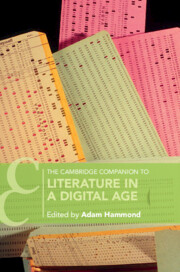Book contents
- The Cambridge Companion to Literature in a Digital Age
- The Cambridge Companion to Literature in a Digital Age
- Copyright page
- Contents
- Figures
- Contributors
- Chronology
- Introduction
- Chapter 1 Literary Data
- Chapter 2 Literary Change
- Chapter 3 The Canon
- Chapter 4 Voice and Performance
- Chapter 5 The Archive
- Chapter 6 Editions
- Chapter 7 Materiality
- Chapter 8 The Literary Marketplace
- Chapter 9 Fanfiction, Digital Platforms, and Social Reading
- Chapter 10 Narrative and Interactivity
- Chapter 11 Generated Literature
- Chapter 12 Literary Gaming
- Chapter 13 The Printed Book in the Digital Age
- Chapter 14 Literature’s Audioptic Platform
- Chapter 15 Critique
- Index
- Cambridge Companions To Literature
Chapter 15 - Critique
Published online by Cambridge University Press: 29 November 2024
- The Cambridge Companion to Literature in a Digital Age
- The Cambridge Companion to Literature in a Digital Age
- Copyright page
- Contents
- Figures
- Contributors
- Chronology
- Introduction
- Chapter 1 Literary Data
- Chapter 2 Literary Change
- Chapter 3 The Canon
- Chapter 4 Voice and Performance
- Chapter 5 The Archive
- Chapter 6 Editions
- Chapter 7 Materiality
- Chapter 8 The Literary Marketplace
- Chapter 9 Fanfiction, Digital Platforms, and Social Reading
- Chapter 10 Narrative and Interactivity
- Chapter 11 Generated Literature
- Chapter 12 Literary Gaming
- Chapter 13 The Printed Book in the Digital Age
- Chapter 14 Literature’s Audioptic Platform
- Chapter 15 Critique
- Index
- Cambridge Companions To Literature
Summary
This chapter examines the relationship between “critique” as a mode of literary work and digital literary studies. It provides a brief genealogy of the origins of critique in early modern textual criticism and eighteenth-century disputes over autonomous criticism, and connects that genealogy to contemporary schools of critique. The debates over critique in digital literary studies are surveyed, along with a range of work in feminist, postcolonial, intersectional, Marxist, and other forms of cultural critique. It analyzes the recent turn to work in “postcritique” and allied theoretical modes, and indicates areas of shared interest as well as boundaries between digital literary studies and the cultures of critique.
- Type
- Chapter
- Information
- The Cambridge Companion to Literature in a Digital Age , pp. 273 - 291Publisher: Cambridge University PressPrint publication year: 2024

